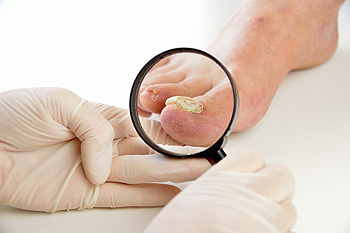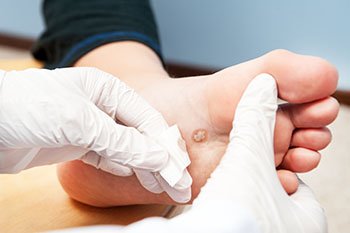Connect With Us
Blog
Home Care for Toenail Fungus
 Fungal nail infections are a common problem that can last for long periods of time and may recur in some individuals. Carefully following the care instructions given to you by your doctor is one of the most important steps to curing this condition. In addition to treatment provided by your doctor, you can also take certain measures at home to help your feet. Wash your feet often and always dry them thoroughly. Keep your nails clean, dry, and neatly trimmed. Since fungi thrive in warm, moist environments, it is important to change out your socks and shoes frequently, especially if you sweat a lot. Avoid walking barefoot in public places, and don’t share personal items, such as towels or nail clippers, to avoid spreading the fungus. For more information about toenail fungus treatment and prevention strategies, consult with a podiatrist.
Fungal nail infections are a common problem that can last for long periods of time and may recur in some individuals. Carefully following the care instructions given to you by your doctor is one of the most important steps to curing this condition. In addition to treatment provided by your doctor, you can also take certain measures at home to help your feet. Wash your feet often and always dry them thoroughly. Keep your nails clean, dry, and neatly trimmed. Since fungi thrive in warm, moist environments, it is important to change out your socks and shoes frequently, especially if you sweat a lot. Avoid walking barefoot in public places, and don’t share personal items, such as towels or nail clippers, to avoid spreading the fungus. For more information about toenail fungus treatment and prevention strategies, consult with a podiatrist.
If left untreated, toenail fungus may spread to other toenails, skin, or even fingernails. If you suspect you have toenail fungus it is important to seek treatment right away. For more information about treatment, contact one of our podiatrists of Foot & Ankle Associates of Maine. Our doctors can provide the care you need to keep you pain-free and on your feet.
Symptoms
- Warped or oddly shaped nails
- Yellowish nails
- Loose/separated nail
- Buildup of bits and pieces of nail fragments under the nail
- Brittle, broken, thickened nail
Treatment
If self-care strategies and over-the-counter medications does not help your fungus, your podiatrist may give you a prescription drug instead. Even if you find relief from your toenail fungus symptoms, you may experience a repeat infection in the future.
Prevention
In order to prevent getting toenail fungus in the future, you should always make sure to wash your feet with soap and water. After washing, it is important to dry your feet thoroughly especially in between the toes. When trimming your toenails, be sure to trim straight across instead of in a rounded shape. It is crucial not to cover up discolored nails with nail polish because that will prevent your nail from being able to “breathe”.
In some cases, surgical procedure may be needed to remove the toenail fungus. Consult with your podiatrist about the best treatment options for your case of toenail fungus.
If you have any questions, please feel free to contact our office located in Brunswick, ME . We offer the newest diagnostic and treatment technologies for all your foot care needs.
Finding Shoes to Fit Your Needs
 When it comes to finding the perfect shoe, we all have different needs, and the shoes that you choose should be comfortable for you and your foot shape. If you have bunions, you may want to buy shoes that have a wide toe box, excellent arch support, and are made out of a flexible material that is not too tight on your feet. If you have high arches, you may want to get shoes that have a rubber heel and extra cushion. If you have flat feet, you may want shoes that have good structure and support for your arches. Finally, if you have wide feet, look for shoes that come in wide sizes. For more information on finding the perfect shoe for you, speak with a podiatrist today.
When it comes to finding the perfect shoe, we all have different needs, and the shoes that you choose should be comfortable for you and your foot shape. If you have bunions, you may want to buy shoes that have a wide toe box, excellent arch support, and are made out of a flexible material that is not too tight on your feet. If you have high arches, you may want to get shoes that have a rubber heel and extra cushion. If you have flat feet, you may want shoes that have good structure and support for your arches. Finally, if you have wide feet, look for shoes that come in wide sizes. For more information on finding the perfect shoe for you, speak with a podiatrist today.
It is important to find shoes that fit you properly in order to avoid a variety of different foot problems. For more information about treatment, contact one of our podiatrists from Foot & Ankle Associates of Maine. Our doctors will treat your foot and ankle needs.
Proper Shoe Fitting
Shoes have many different functions. They cushion our body weight, protect our feet, and allow us to safely play sports. You should always make sure that the shoes you wear fit you properly in order to avoid injuries and deformities such as: bunions, corns, calluses, hammertoes, plantar fasciitis, stress fractures, and more. It is important to note that although a certain pair of shoes might be a great fit for someone else, that doesn’t mean they will be a great fit for you. This is why you should always try on shoes before buying them to make sure they are worth the investment. Typically, shoes need to be replaced ever six months to one year of regular use.
Tips for Proper Shoe Fitting
- Select a shoe that is shaped like your foot
- Don’t buy shoes that fit too tight, expecting them to stretch to fit
- Make sure there is enough space (3/8” to ½”) for your longest toe at the end of each shoe when you are standing up
- Walk in the shoes to make sure they fit and feel right
- Don’t select shoes by the size marked inside the shoe, but by how the shoe fits your foot
The shoes you buy should always feel as good as they look. Shoes that fit properly will last longer, feel better, and improve your way of life each day.
If you have any questions, please feel free to contact our office located in Brunswick, ME . We offer the newest diagnostic and treatment technologies for all your foot care needs.
Why Live with Pain and Numbness in Your Feet?
Are Plantar Warts Contagious?
Plantar warts are warts that develop on the bottom of the feet. These warts are caused by the human papillomavirus (HPV), a contagious virus that infects the top layer of skin. HPV typically enters the body through broken skin, and warts are spread through direct contact with the virus. Sharing personal items that can harbor the virus, such as towels, shoes, socks, and razors can cause an infection. If you already have a wart, you can also reinfect yourself by touching the wart and then touching another part of your body. Warts often take months to develop after you have come in contact with HPV, so it is important to prevent HPV infections in the first place. Some prevention strategies include not sharing personal items, keeping the feet dry, and wearing shoes when walking through public areas or on warm, moist surfaces, like those at a public swimming pool. For more information about plantar warts, consult with a podiatrist.
Plantar warts can be very uncomfortable. If you need your feet checked, contact one of our podiatrists from Foot & Ankle Associates of Maine. Our doctors will assist you with all of your foot and ankle needs.
About Plantar Warts
Plantar warts are the result of HPV, or human papillomavirus, getting into open wounds on the feet. They are mostly found on the heels or balls of the feet.
While plantar warts are generally harmless, those experiencing excessive pain or those suffering from diabetes or a compromised immune system require immediate medical care. Plantar warts are easily diagnosed, usually through scraping off a bit of rough skin or by getting a biopsy.
Symptoms
- Lesions on the bottom of your feet, usually rough and grainy
- Hard or thick callused spots
- Wart seeds, which are small clotted blood vessels that look like little black spots
- Pain, discomfort, or tenderness of your feet when walking or standing
Treatment
- Freezing
- Electric tool removal
- Laser Treatment
- Topical Creams (prescription only)
- Over-the-counter medications
To help prevent developing plantar warts, avoid walking barefoot over abrasive surfaces that can cause cuts or wounds for HPV to get into. Avoiding direct contact with other warts, as well as not picking or rubbing existing warts, can help prevent the further spread of plantar warts. However, if you think you have developed plantar warts, speak to your podiatrist. He or she can diagnose the warts on your feet and recommend the appropriate treatment options.
If you have any questions please feel free to contact our office located in Brunswick, ME . We offer the newest diagnostic and treatment technologies for all your foot and ankle needs.


